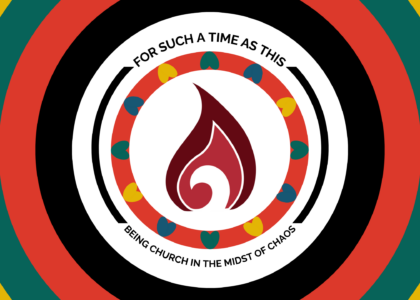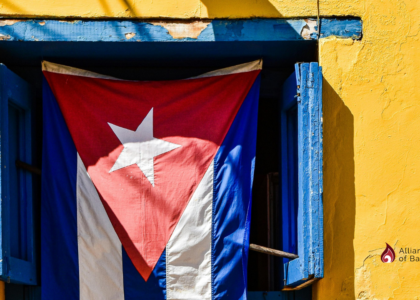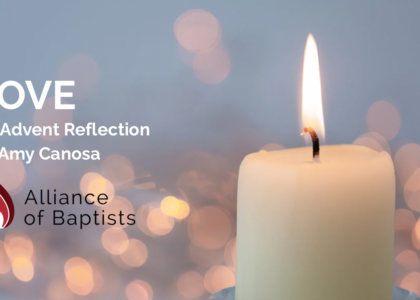By Aurelia Dávila Pratt
Many folks who are deconstructing their faith have also been deconstructing their patriotism. People are wrestling with both God and country, untangling the two from one another in order to have a healthier relationship with each.
In truth, it is a serious problem that Christian faith leaders and politicians continue to normalize the myth that the U.S. is a “Christian nation” and that any belief otherwise is an act of persecution toward Christianity.
In reality, many of those who fled to the U.S. colonies as a result of religious persecution sought out religious liberty for all, not just for themselves.
Thomas Helwys wrote in favor of religious liberty for all when he said, “Let them be heretics, Turks, Jews, or whatsoever, it appertains not to the earthly power to punish them in the least measure.” Helwys would go on to co-found the General Baptist denomination, with a founding tenet being the separation of church and state.
Further, it was John Leland, a Baptist minister and abolitionist who said, “The only way to prevent religion from being an engine of cruelty is to exclude religious opinions from the civil code.”
All it takes is a little bit of learning and critical thinking to realize that Christian nationalism is not only harmful for society as a whole, but it dilutes the beauty and goodness the Christian faith is meant to embody.
My pastoral observation has been that those courageous enough to enter into the work of faith deconstruction will find themselves thoughtfully deconstructing their relationship with patriotism as well.
This makes sense to me because deconstructing and decolonizing ought to go hand in hand. We deconstruct when we willingly loop in learning, critical thinking, and evolving into our faith processes. We decolonize whenever we actively untangle ourselves from systems of oppression and embody the necessary reparations.
In my book, A Brown Girl’s Epiphany, I say,
Some of us may be able to get through deconstruction with our faith intact, but decolonizing will not let us off the hook so easily. It will present us with the truth that Christianity is a whole hot mess. It will require us to reckon with how the Bible has been used as its weapon of mass destruction. With that sacred text in tow, Christianity spearheaded the domination of stolen land from Indigenous peoples in our country and across the world. It placed its blessing upon slavery. And it continues to perpetuate violence against women, the queer community, and the earth itself.
This is the truth of our history. It matters because it still impacts all of us, but especially those whose ancestors bore the brunt of early forms of Christian nationalism.
So if you find yourself with mixed feelings on the Fourth of July, join the crowd and take heart. You are paying attention! You are confronting the realities we have inherited.
If you find yourself feeling frustrated, disappointed, or annoyed by surface-level patriotism, patriotism that has been hijacked by partisan politics, ungenerous patriotism that is not concerned with freedom for all, or patriotism conflated with “Christian” ideologies—you are not alone.
You are a part of a great cloud of witnesses who genuinely want more for all of us. Your wrestling reflects a commitment to nuance. Your willingness to engage paradox is your superpower. Your anger is a sign that you care.
My friend, Jana, often tells me that anger is a secondary emotion and therefore an invitation to go deeper to the heart of things.
The truth is, many of us don’t criticize Christianity because we hate it. Rather, we criticize it because it has been our home, our roots, our community, and our sense of belonging. We want more for our tradition that preaches the way of Christ.
Similarly, many of us don’t criticize our country because we hate it, but because this is our home, our roots, and the place where our sense of identity and belonging has been cultivated. We want more for this place that preaches liberty and justice for all.
So we critique because we care. We get angry because we care. We deconstruct and decolonize because we care. And on the Fourth of July, we may give a little side eye because, well, we care.
We critique these institutions and we untangle them from one another because we care. It makes us better Americans and more thoughtful Christians because of it.
So, want to be a good Christian? Critique Christianity. Want to be a good American? Critique the “land of the free.” Critique, not out of reactivity to all the chaos, but from the sustainable source of love.
Love demands our anger and critique. Love demands our attention, tender care, and action.
Most importantly, love won’t settle for anything less than heaven on earth. For those having mixed feelings on the Fourth of July, it sounds like you won’t either. Hallelujah. May it be so.

Aurelia Dávila Pratt is the lead pastor of Peace of Christ Church in Round Rock, Texas, and cohost of the Nuance Tea Podcast where she is redefining what it means to be a clergywoman of color. Her book, A Brown Girl’s Epiphany, is available for purchase from the publisher, Broadleaf books. Learn more at revaureliajoy.com.





Wow, wow, wow!!! So well said!!!